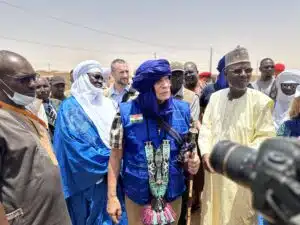Brussels – Five months have passed, but Niger’s president, Mohamed Bazoum, is still a prisoner of the military junta that seized power in late July. “Following the example of Ecowas, the European Union continues to call for his and his family’s release,” is the constant plea of the EU High Representative for Foreign Affairs and Security Policy, Josep Borrell, amid a highly problematic diplomatic environment in the Sahel with no positive developments.

Since the July 26 coup, there has been no room for diplomatic mediation in the last of the Economic Community of West African States (ECOWAS) countries to see an armed takeover by the military junta. To the point that France, the largest European and Western player in Niamey, is ready to abandon the country. According to the Afp news agency, the French ambassador to Niger, Sylvain Itté, has sent a letter to his staff announcing that the embassy will be closed soon since it is “no longer able to function normally or carry out its tasks” due to the hostile climate exercised by the military junta. Since President Bazoum was deposed, the coup plotters have explicitly approached Vladimir Putin’s Russia and ordered the expulsion of the 1,500 French military personnel engaged on Niger soil in operations to counter Islamic extremist groups affiliated with the Islamic State and Al-Qaeda. The evacuation ended last Friday (Dec. 22), while, for the time being, the U.S., Italian and German soldiers will be allowed to remain in Niger.
But the diplomatic climate remains tense for the European Union as well, particularly after the adoption of the autonomous framework for restrictive measures against the military junta in Niger (which matches that of Ecowas) in late October. “The EU regrets the junta’s decision to denounce the agreement establishing the legal basis for the deployment of the Eucap Sahel Niger mission and the Eumpm military cooperation mission,” the EU High Representative Borrell denounced earlier this month, warning that Brussels “will draw the necessary operational conclusions.” In its 11-year presence in the country, Eucap Sahel Niger has supported and trained internal security forces in the fight against terrorism, organized crime, and irregular migration at the request of national authorities with the deployment of 130 soldiers from EU member countries. In contrast, the Eumpm Niger mission – also launched at the invitation of the Niger authorities – was designed to support the national army in the fight against terrorism.
The Coup in Niger
On July 26, the Niger Presidential Guard surrounded the presidential palace and several ministry buildings in Niamey, arresting President Bazoum (in office since 2021), his family, and members of the entourage. The head of what later renamed itself the National Council for the Safeguarding of the Country (Cnsp), Abdourahmane Tchiani, proclaimed himself the country’s new leader: the coup plotters ordered the suspension of all institutions, the closure of air and land borders, and a nighttime curfew. The Niger Army – trained by the EU through the Eumpm Niger Military Partnership – also joined the Presidential Guard to “preserve national unity.” IIn a decree announced on Aug. 7, the junta-appointed former finance minister Ali Mahamane Lamine Zeine as transitional prime minister, and three days later, the military junta formed a government of 21 ministers.
In the past two years, there have been several coups in West African countries – namely in Mali, Guinea, and Burkina Faso – whose respective military juntas now in power have threatened to defend the coup plotters in Niger in the event of an armed attack by the Ecowas. For the European Union, Niamey was considered a key ally, especially in the fight against Islamist-driven terrorism and within the context of a partnership on migration. “Our partnership with Niger is solid and is growing stronger in all areas: security, development, education, energy transition,” High Representative Borrell said on July 5 after a meeting with Bazoum in Niamey. Since July 26, all EU funds for cooperation with Niamey have been suspended, including those mobilized through the European Peace Facility to “strengthen the military capabilities of the Niger Armed Forces in order to defend the territorial integrity and sovereignty of Niger.”
English version by the Translation Service of Withub




